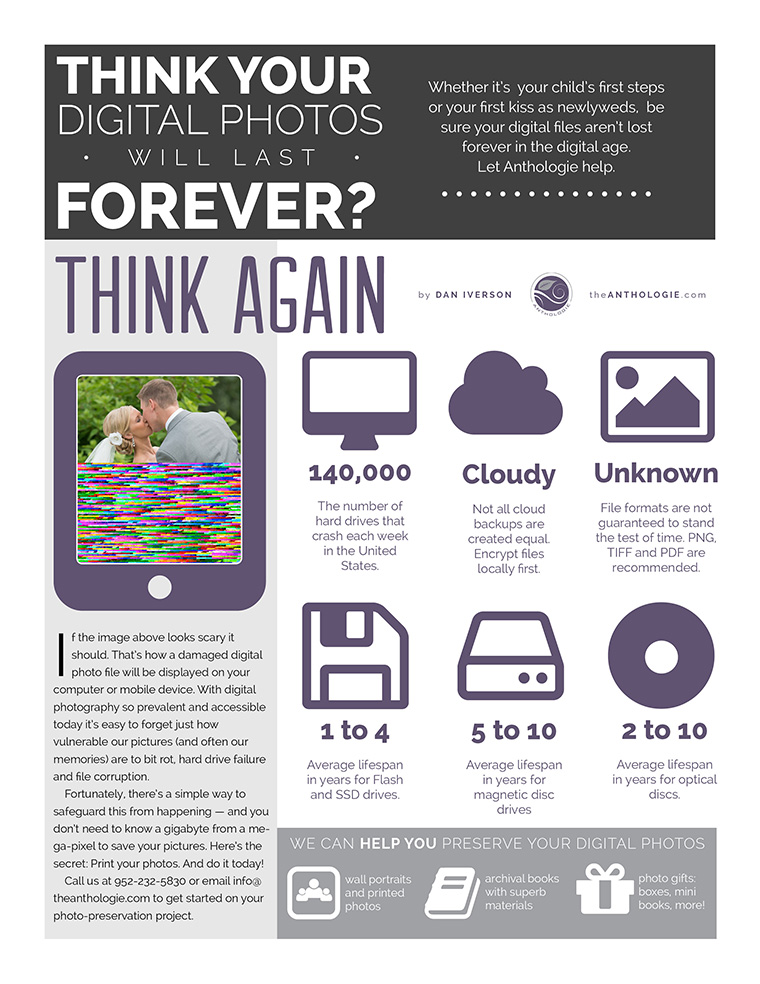It will never happen to me. That's what I thought. I had heard anecdotes through social media about parents loosing pictures of their young children — some times even their entire libraries of baby photos gone with one fell swoop of a ticking hard drive. As a photographer, and someone who makes a living selling and preserving my work I figured I would never experience such a calamity. I was wrong. Well, at least partly wrong.
My wakeup call came a few months back when I went to retrieve one of my favorite photos of my son. I photographed him just before the Fourth of July holiday last year dashing from the beach and into an area lake without a care in the world for the summer wardrobe he was wearing. To me it's perfect. It exemplifies childhood. And best of all, he's completely unaware of the camera (a rarity in our household). As I searched through my external hard drive my finder window revealed the unmistakeable sight of a once perfect photo now rendered useless as a few fragmented strips of pixels. The digital file was corrupt. My heart sank.
The queasiness factor jumped to earthquake proportions when the reality of the situation sunk in. As a professional photographer I create 10s of thousands of photos for my clients each year. I take pride in protecting those memories and take all of the necessary steps to ensure this doesn't happen. Right? And yet there I sat, staring at my laptop knowing I couldn't even keep safe one of my favorite photos from my own family. So, was I faced with the hard truth that my precious memory was gone forever? No. And here's why: I print my photos. Yep, I know it sounds strange in the digital age of 64GB memory cards and 40 mega-pixel camera phones, but making high-quality, physical copies of your favorite pictures is still one of the easiest ways to safeguard against bit rot and file corruption. So, safe in my living room was a beautiful 24x36-inch wall portrait of my son's little adventure at the beach.
OK, the business owner in me needs to tell you that I actually did have this photo backed up in a redundant archive, so I was also able to find a "safe" version of the digital file in question. But there's always room for improvement to the way I do things and this situation did force me to review the entire way I approach backing up data and my photography workflow as a whole. I even consulted with a computer security systems expert who was baffled by the amount of data I'm tasked with protecting. To paraphrase him: "Hard drives are like good steaks in the freezer. It's not a matter of if they'll go bad but when." 50,000 images could disappear in an instant. Gulp.
In an effort to help bring some of this unsettling information to light, and to show you it doesn't have to be so scary (or daunting) to protect your photos, I've created this handy infographic (on the right). I mainly hope it illustrates that while the specific data on hardware failure rates is widely varied (it often comes down to what different manufacturers say about their own products), the threat of loosing digital photos forever is very real. But don't worry. We can help.
We can create fantastic photo gifts, print archival photographs and produce gorgeous books that will last for hundreds of years. I'll be making some changes at Anthologie, too.
Digital photo retirement schedule: Most people are shocked to learn how long I really do hold on to digital photos for my clients. However, the review of my workflow has made me realize it's not feasible or secure to continue preserving 40,000 to 70,000 new photographs each year in redundant archives. While digital storage continues to get more affordable, each frame I produce is more than 100MB. Do the math : ) New schedules will be in place to permanently remove photos from my archives. Existing clients can expect to be contacted by me for larger projects, such as weddings or a child's first year, before the images are purged. You will have the opportunity to purchase full-resolution printing rights at greatly reduced rates before the photos are deleted. If you have specific questions about your project, please feel free to contact me at info (at) theanthologie.com or by calling 952-232-5830.
Photo sessions with more options for copyright releases and digital files: While I have always offered the ability to purchase full-resolution printing rights, most people tend to opt for what's already included in their photography collection simply due to the cost savings. However, I will be creating more collections with a "middle ground" so that clients can back up and preserve their own digital photos right away.
Please feel free to share this information with others, and let me know what you think. Thanks for viewing!


